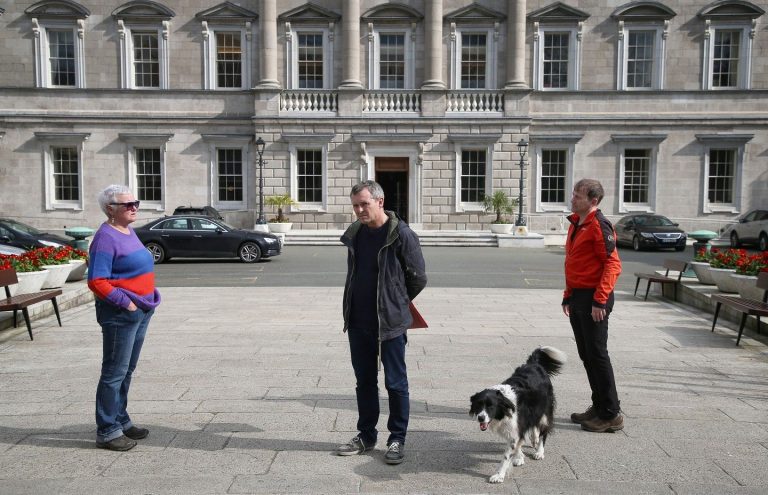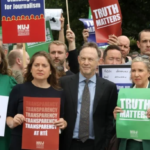Party will make the call at the Dáil Business Committee this week
People Before Profit has said that this week, they will call on the government to allow time be given to a debate on a motion the party has produced on breast cancer screening.
The party said that their TD and representative on the Dáil Business Committee, Richard Boyd Barrett, will make the call this week at the committee meeting.
Gino Kenny TD, the party’s spokesperson on Health, said: “We are asking that the government allow for time to be taken on this very important issue of breast screening.
“A shocking statistic is that Ireland had the 8th highest incidence rate and 5th highest mortality rate for female breast cancer in the EU in 2020.
“Our motion makes a number of calls on the government, including: To introduce screening for breast cancer from the age of 40 provided by publicly funded and run programmes and to guarantee immediate access to diagnostics services for young women at risk of breast cancer.
“Today being International Women’s Day, we think it would be very appropriate for the government to accept this request so that we can have a proper debate on this most urgent subject.”
Notes to editors: Copy of People Before Profit Breast Screening motion:
Dail Eireann notes
-Breast cancer in women accounts for around 30% of all invasive cancers for women with around 3,000 cases a year.
-Ireland had the 8th highest incidence rate and 5th highest mortality rate for female breast cancer in the EU in 2020.
-Women between 50 and 64 have been screened for breast cancer since 2018. This was subsequently extended to 69.
-In 2015 49% of cases were accounted for by those aged between 50 and 69 while
-Almost a quarter of cases occur in women under 50 and therefore outside the screening process.
– In 2015 that over 200 cases among women under 40, 7% of all cases.
-Between 1994 and 2016 rates of breast cancer in women under 50 increased by, on average, 1% per year, from 34.2 per 100,000 in 1994 to 45.1 per 100,000 in 2016.
-The percentage of younger women with a late stage (III or IV) diagnosis increased from 18% in 1994-1999 to 22% in 2008- 2015.
-In contrast, there was a large increase in the percentage presenting with stage I cancer for women in the screening age-group (50-64 years), from 23% in 1994-1999 to 44% in 2008-2015.
-The rate of increase in late stage breast cancer was 2.4% per year for younger women while the rate for women in the screening age band was 0.4%.
-That the National Cancer Registry Ireland has said that “This suggests that there has been some stage replacement in the women who are eligible for screening”.
-Screening from age 40 takes place in a number of countries such as Austria, Greece, Hungary, Iceland, Slovakia and Portugal.
– In some regions in Sweden where screening was introduced for 40-49 year-olds, the death rate reduced by 26% compared to regions who didn’t.
-Young women generally face more aggressive cancers and lower survival rates as well as being more liable to get cancer due to genetic mutations
-That women under 40 are reporting that they are finding it hard to access early diagnosis.
-Young women are also liable to get cancer due to genetic mutations
-There are no national data on the proportion of breast cancer cases which are due to BRCA mutations and no comprehensive national policy on genetics and genetic testing in Ireland.
-While Ireland has established criteria for genetic testing for hereditary breast cancer, these are more restrictive than in many other European countries.
-That Ireland does not make genetic testing available to all asymptomatic women at high risk of BRCA related breast cancer.
-Waiting times for an initial public consultation, genetic testing and counselling are high, placing a burden on people waiting for tests and potentially delaying initiation of necessary treatment.
-Women are being forced to seek private genetic testing at cost of up to €1800.
-Poorer women are therefore barred from accessing this service.
And therefore calls on the government
-To introduce screening for breast cancer from the age of 40 provided by publicly funded and run programmes
-To guarantee immediate access to diagnostics services for young women at risk of breast cancer
-Ensure access to a triple assessment for young women who present with possible breast cancer
-To immediately revise the of criteria for access to genetic testing so that all women at high risk of BRCA related breast cancer have access to genetic testing and genetic counselling in the public health system
-To initiate a publicly funded education programme in schools in relation to breast examination.












